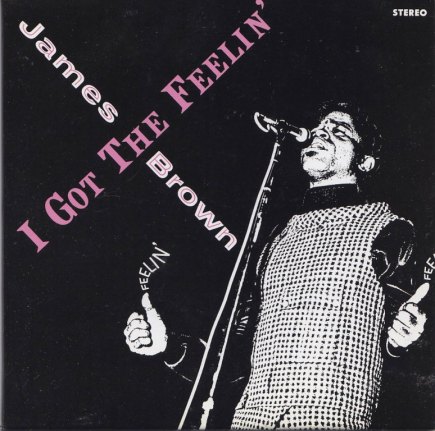Simply put, this is probably one of James Brown’s all-time greatest, most consistently hot and funky records that he ever put out.
“I Got the Feelin'” released as a single in 1968 & it reached #1 on the R&B charts and #6 on the pop charts. It also appeared on a 1968 album of the same name.
The Jackson Five auditioned for Motown founder Berry Gordy in 1968 with a filmed performance of “I Got the Feelin'”, with the ten-year-old Michael Jackson closely mimicking Brown’s vocal style and dance moves…
Monthly Archives: June 2016
Gravelroad – Psychedelta
Psychedelta, the new album by the Seattle-based trio GravelRoad, is a primal, raw, hard driving, yet accessible album that presents the blues in a new light. It is rough and tumble psychedelic rocking blues. The album pushes and pulses from one track to the other, yet it never loses a consistent rhythm that can create a trance or a boogie with the grace of a slide, the thunder of the drums, or the scream of a blistering riff. With tracks like “Devil Eyes,” Keep on Moving,” and “In the Woods,” GravelRoad offers up sounds that are familiar but unique. They reach further and break new ground on tracks like “Caves” and “Deep Blues Theme,” while using “Nobody Gets Me Down (original by T-Model Ford) and “Furry” (an ode to the late Furry Lewis) to honor those that have come before them and serve as vital influences. Psychedelta is GravelRoad’s follow up album to Shot The Devil (Uncle Larry Records, 2008). It is a natural progression and culmination of sonic dynamism for a band that has steadily labored on their own music while also partnering with notorious blues-rebel T-Model Ford for the past 3+ years. GravelRoad has performed on multiple national and international tours and at numerous renowned festivals with Mr. Ford, including All Tomorrow’s Parties (New York, 2010), The End of the Road Festival (UK, 2009), the Vancouver Folk Music Festival (Canada, 2008) and the Deep Blues Festivals (Minnesota, 2008 and 2009), to name a few. Additionally, they have assisted the nonagenarian with his last two albums, the varied and critically acclaimed efforts, The Ladies Man (Alive Records, 2010) and Taledragger (Alive Records, 2011). The band’s energy, enthusiasm, and passion are present in all of their musical and creative endeavors. With a number of exciting opportunities ahead of them, the band is looking forward to making new associations and allegiances with like-minded music professionals who appreciate their music and their drive. GravelRoad has a mission: they wish to make music that is vital and relevant in the present, while acknowledging and participating with the musical history around them, and staying ahead of the curve as they move forward. Do you hear it?
Chris Thomas King – Rise
New Orleans musician Chris Thomas King lost both a home and a recording studio when Hurricane Katrina had landfall at the close of summer in 2005, and it’s hardly startling that his album Rise takes Katrina and the devastating aftermath of the storm as a central theme. The result is a tremendously elegiac outing, and even when King goes up-tempo, as he does on a cover of Joni Mitchell’s “Big Yellow Taxi,” the song itself is all about incalculable loss and the incredible indifference of contemporary America to its own personal history. Things are drowning and washing away in song after song on Rise, and King isn’t afraid to name names. In “Faith,” the song’s narrator clings to a rooftop as bodies float by and he realizes that President Bush is in a plane over New Orleans in the same instant, and it is a powerful moment that literally defines the notion of differing perspectives. Does he really care, the narrator wonders. Rise deals with loss, death and the hope for rebirth in mostly hushed tones, and while many still think of King as primarily a blues artist, the album is really closer to a kind of pop gospel outing, only stripped of much of the certainty and joy that gospel usually conveys. Rise is King’s personal revaluation of America, and the truths he examines are unclear, as perhaps they have always been. Although it works as one long and mostly melancholy suite, a few of Rise’s songs do stand out, like the ominous and ultimately resigned “Flow Mississippi Flow,” a lightly rewritten version of “St. James Infirmary” (certainly one of the most death-haunted songs in the whole history of American music) and the elegant “‘Tis the Last Rose of Summer,” which is dedicated to King’s mother, who passed in December of 2005. King didn’t record this album to further his career so much as a way to stumble towards an understanding of America in the 21st century, using Katrina as a necessary lens. Again, he doesn’t come up with answers, but sometimes it’s the questions that matter most, although asking why, King suggests, isn’t particularly useful when everything has been washed away. What now, is the real question, and the answer to that question is still up in the air. The nature of modern media is to move on to the next thing. King and others whose lives were forever changed by Katrina and its aftermath don’t have that option.


![Gravelroad - Psychedelta [2012]-front.jpg](https://granazibar.files.wordpress.com/2016/06/gravelroad-psychedelta-2012-front.jpg?w=425&h=383)
